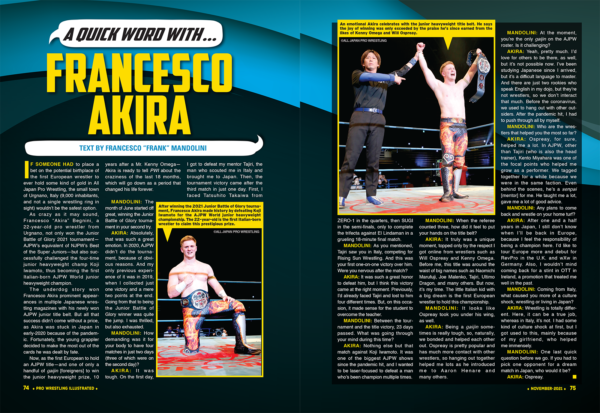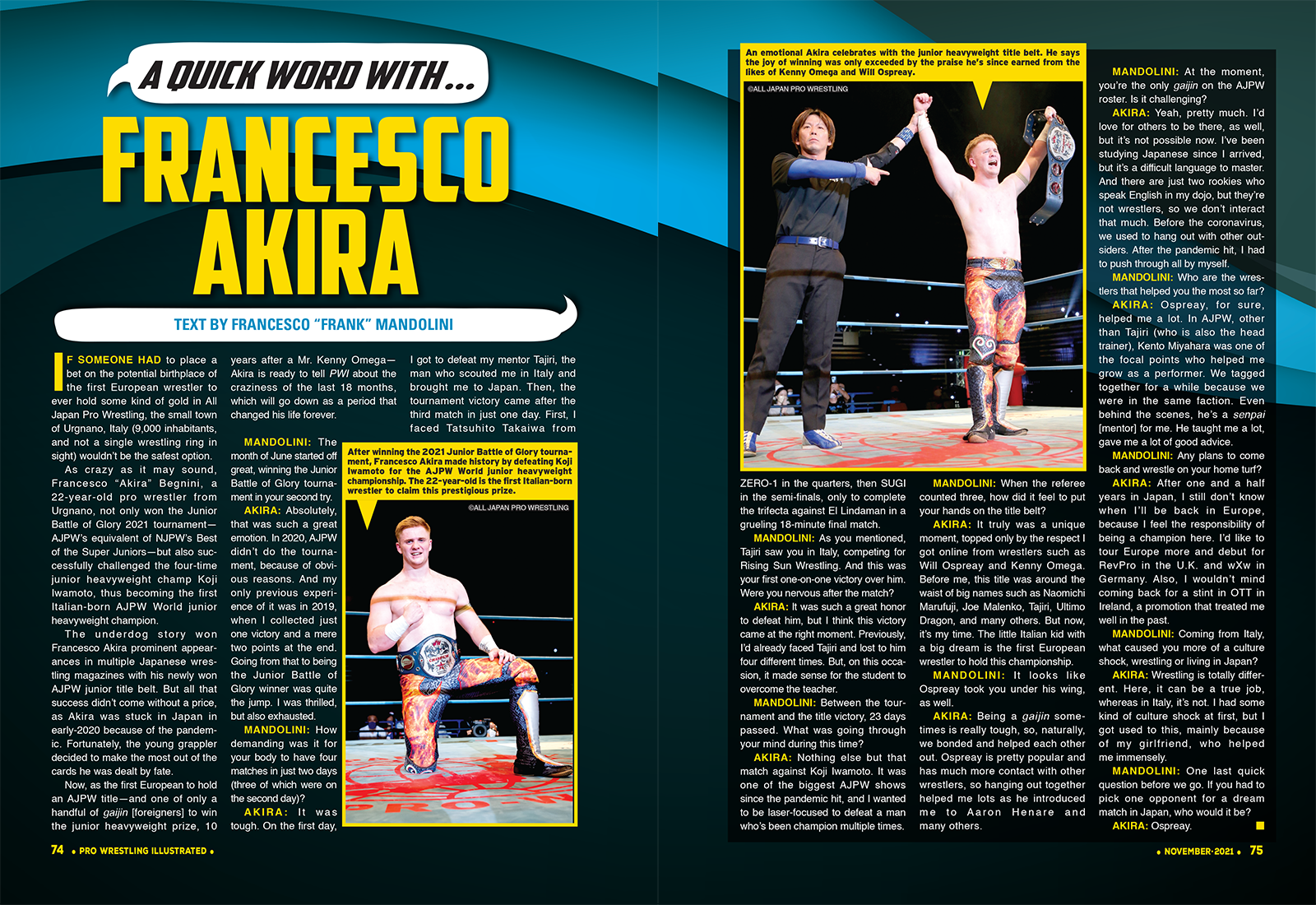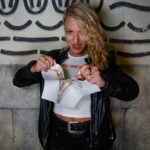A QUICK WORD WITH … Francesco Akira
TEXT BY: Francesco “Frank” Mandolini

(This story was first printed in the November 2021 issue of Pro Wrestling Illustrated magazine.)
IF SOMEONE HAD to place a bet on the potential birthplace of the first European wrestler to ever hold some kind of gold in All Japan Pro Wrestling, the small town of Urgnano, Italy (9,000 inhabitants, and not a single wrestling ring in sight) wouldn’t be the safest option. As crazy as it may sound, Francesco “Akira” Begnini, a 22-year-old pro wrestler from Urgnano, not only won the Junior Battle of Glory 2021 tournament—AJPW’s equivalent of NJPW’s Best of the Super Juniors—but also successfully challenged the four-time junior heavyweight champ Koji Iwamoto, thus becoming the first Italian-born AJPW World junior heavyweight champion.
The underdog story won Francesco Akira prominent appearances in multiple Japanese wrestling magazines with his newly won AJPW junior title belt. But all that success didn’t come without a price, as Akira was stuck in Japan in early-2020 because of the pandemic. Fortunately, the young grappler decided to make the most out of the cards he was dealt by fate. Now, as the first European to hold an AJPW title—and one of only a handful of gaijin [foreigners] to win the junior heavyweight prize, 10 years after a Mr. Kenny Omega—Akira is ready to tell PWI about the craziness of the last 18 months, which will go down as a period that changed his life forever.
MANDOLINI: The month of June started off great, winning the Junior Battle of Glory tournament in your second try.
AKIRA: Absolutely, that was such a great emotion. In 2020, AJPW didn’t do the tournament, because of obvious reasons. And my only previous experience of it was in 2019, when I collected just one victory and a mere two points at the end. Going from that to being the Junior Battle of Glory winner was quite the jump. I was thrilled, but also exhausted.
MANDOLINI: How demanding was it for your body to have four matches in just two days (three of which were on the second day)?
AKIRA: It It was tough. On the first day, I got to defeat my mentor Tajiri, the man who scouted me in Italy and brought me to Japan. Then, the tournament victory came after the third match in just one day. First, I faced Tatsuhito Takaiwa from ZERO-1 in the quarters, then SUGI in the semi-finals, only to complete the trifecta against El Lindaman in a grueling 18-minute final match.
MANDOLINI: As you mentioned, Tajiri saw you in Italy, competing for Rising Sun Wrestling. And this was your first one-on-one victory over him. Were you nervous after the match?
AKIRA: It was such a great honor to defeat him, but I think this victory came at the right moment. Previously, I’d already faced Tajiri and lost to him four different times. But, on this occasion, it made sense for the student to overcome the teacher.
MANDOLINI: Between the tournament and the title victory, 23 days passed. What was going through your mind during this time?
AKIRA: Nothing else but that match against Koji Iwamoto. It was one of the biggest AJPW shows since the pandemic hit, and I wanted to be laser-focused to defeat a man who’s been champion multiple times.
MANDOLINI: When the referee counted three, how did it feel to put your hands on the title belt?
AKIRA: It truly was a unique moment, topped only by the respect I got online from wrestlers such as Will Ospreay and Kenny Omega. Before me, this title was around the waist of big names such as Naomichi Marufuji, Joe Malenko, Tajiri, Ultimo Dragon, and many others. But now, it’s my time. The little Italian kid with a big dream is the first European wrestler to hold this championship.
MANDOLINI: It looks like Ospreay took you under his wing, as well.
AKIRA: Being a gaijin sometimes is really tough, so, naturally, we bonded and helped each other out. Ospreay is pretty popular and has much more contact with other wrestlers, so hanging out together helped me lots as he introduced me to Aaron Henare and many others.
MANDOLINI: At the moment, you’re the only gaijin on the AJPW roster. Is it challenging?
AKIRA: Yeah, pretty much. I’d love for others to be there, as well, but it’s not possible now. I’ve been studying Japanese since I arrived, but it’s a difficult language to master. And there are just two rookies who speak English in my dojo, but they’re not wrestlers, so we don’t interact that much. Before the coronavirus, we used to hang out with other outsiders. After the pandemic hit, I had to push through all by myself.
MANDOLINI: Who are the wrestlers that helped you the most so far?
AKIRA: Ospreay, for sure, helped me a lot. In AJPW, other than Tajiri (who is also the head trainer), Kento Miyahara was one of the focal points who helped me grow as a performer. We tagged together for a while because we were in the same faction. Even behind the scenes, he’s a senpai [mentor] for me. He taught me a lot, gave me a lot of good advice.
MANDOLINI: Any plans to come back and wrestle on your home turf?
AKIRA: After one and a half years in Japan, I still don’t know when I’ll be back in Europe, because I feel the responsibility of being a champion here. I’d like to tour Europe more and debut for RevPro in the U.K. and wXw in Germany. Also, I wouldn’t mind coming back for a stint in OTT in Ireland, a promotion that treated me well in the past.
MANDOLINI: Coming from Italy, what caused you more of a culture shock, wrestling or living in Japan?
AKIRA: Wrestling is totally different. Here, it can be a true job, whereas in Italy, it’s not. I had some kind of culture shock at first, but I got used to this, mainly because of my girlfriend, who helped me immensely.
MANDOLINI: One last quick question before we go. If you had to pick one opponent for a dream match in Japan, who would it be?
AKIRA: Ospreay.





